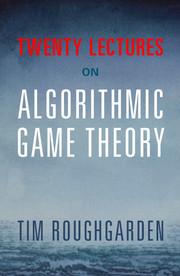Book contents
- Frontmatter
- Dedication
- Contents
- Preface
- 1 Introduction and Examples
- 2 Mechanism Design Basics
- 3 Myerson's Lemma
- 4 Algorithmic Mechanism Design
- 5 Revenue-Maximizing Auctions
- 6 Simple Near-Optimal Auctions
- 7 Multi-Parameter Mechanism Design
- 8 Spectrum Auctions 97
- 9 Mechanism Design with Payment Constraints 113
- 10 Kidney Exchange and Stable Matching
- 11 Selfish Routing and the Price of Anarchy
- 12 Over-Provisioning and Atomic Selfish Routing
- 13 Equilibria: Definitions, Examples, and Existence
- 14 Robust Price-of-Anarchy Bounds in Smooth Games
- 15 Best-Case and Strong Nash Equilibria
- 16 Best-Response Dynamics
- 17 No-Regret Dynamics
- 18 Swap Regret and the Minimax Theorem
- 19 Pure Nash Equilibria and PLS-Completeness
- 20 Mixed Nash Equilibria and PPAD-Completeness
- The Top 10 List
- Hints to Selected Exercises and Problems
- Bibliography
- Index
16 - Best-Response Dynamics
Published online by Cambridge University Press: 05 August 2016
- Frontmatter
- Dedication
- Contents
- Preface
- 1 Introduction and Examples
- 2 Mechanism Design Basics
- 3 Myerson's Lemma
- 4 Algorithmic Mechanism Design
- 5 Revenue-Maximizing Auctions
- 6 Simple Near-Optimal Auctions
- 7 Multi-Parameter Mechanism Design
- 8 Spectrum Auctions 97
- 9 Mechanism Design with Payment Constraints 113
- 10 Kidney Exchange and Stable Matching
- 11 Selfish Routing and the Price of Anarchy
- 12 Over-Provisioning and Atomic Selfish Routing
- 13 Equilibria: Definitions, Examples, and Existence
- 14 Robust Price-of-Anarchy Bounds in Smooth Games
- 15 Best-Case and Strong Nash Equilibria
- 16 Best-Response Dynamics
- 17 No-Regret Dynamics
- 18 Swap Regret and the Minimax Theorem
- 19 Pure Nash Equilibria and PLS-Completeness
- 20 Mixed Nash Equilibria and PPAD-Completeness
- The Top 10 List
- Hints to Selected Exercises and Problems
- Bibliography
- Index
Summary
This lecture segues into the third part of the course, where we ask: Do we expect strategic agents to reach an equilibrium? If so, which learning algorithms quickly converge to an equilibrium? Reasoning about these questions requires specifying dynamics, which describe how agents act when not at equilibrium. We consider dynamics where each agent's behavior is governed by an algorithm that attempts to, in some sense, learn the best response to how the other agents are acting. Ideally, we seek results that hold for multiple simple and natural learning algorithms. Then, even though agents may not literally follow such an algorithm, we can still have some confidence that our conclusions are robust and not an artifact of the particular choice of dynamics. This lecture focuses on variations of “best-response dynamics,” while the next two lectures study dynamics based on regret-minimization.
Section 16.1 defines best-response dynamics and proves convergence in potential games. Sections 16.2 and 16.3 introduce e-best-response dynamics and prove that several variants of it converge quickly in atomic selfish routing games where all agents have a common origin and destination. Section 16.4 proves that, in the (λ, μ)-smooth games defined in Lecture 14, several variants of best-response dynamics quickly reach outcomes with objective function value almost as good as at an equilibrium.
Best-Response Dynamics in Potential Games
Best-response dynamics is a straightforward procedure by which agents search for a pure Nash equilibrium (PNE) of a game (Definition 13.2), using successive unilateral deviations.
Information
- Type
- Chapter
- Information
- Twenty Lectures on Algorithmic Game Theory , pp. 216 - 229Publisher: Cambridge University PressPrint publication year: 2016
Accessibility standard: Unknown
Why this information is here
This section outlines the accessibility features of this content - including support for screen readers, full keyboard navigation and high-contrast display options. This may not be relevant for you.Accessibility Information
- 3
- Cited by
